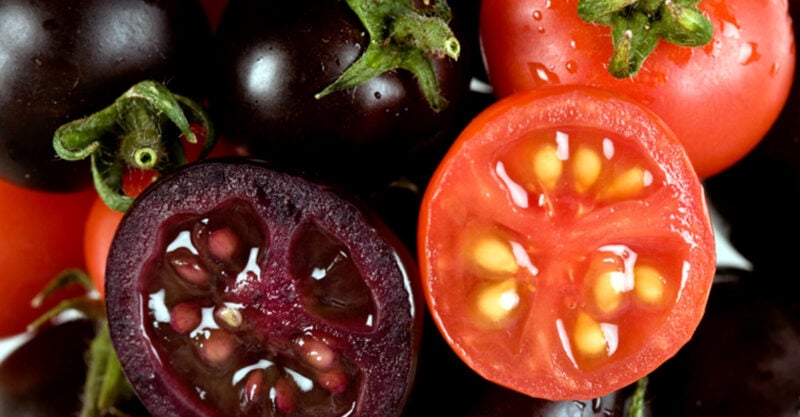by Dr. Joseph Mercola, Childrens Health Defense:
 The U.S. Department of Agriculture favorably reviewed genetically engineered purple tomatoes, engineered by Norfolk Plant Sciences to be rich in anthocyanins, the pigments that give blueberries, blackberries and certain other deeply-hued produce their color.
The U.S. Department of Agriculture favorably reviewed genetically engineered purple tomatoes, engineered by Norfolk Plant Sciences to be rich in anthocyanins, the pigments that give blueberries, blackberries and certain other deeply-hued produce their color.
TRUTH LIVES on at https://sgtreport.tv/
Story at a glance:
- The U.S. Department of Agriculture (USDA) favorably reviewed genetically engineered purple tomatoes, developed by Norfolk Plant Sciences.
- The USDA found the genetically engineered (GE) plant is “unlikely to pose an increased plant pest risk compared to other cultivated tomatoes and is not subject to regulation …”
- This says nothing of GE purple tomatoes’ potential to wreak havoc on human health but moves the plants one step closer to reaching your grocery store.
- The genetically modified (GMO) purple tomatoes were engineered to be rich in anthocyanins, the pigments that give blueberries, blackberries and certain other deeply-hued produce their color.
- Scientists used two transcription factors from snapdragon plants to increase anthocyanins in tomatoes.
- Considering there are already anthocyanin-rich foods found in nature, it’s unnecessary, and potentially dangerous, to genetically engineer one using a tomato infused with snapdragon genes.
Nothing signals summer like a red, ripe juicy tomato, but soon this mainstay of backyard gardens and farmers’ markets may be met with a new kid on the block — a genetically engineered purple tomato.
The U.S. Department of Agriculture’s Animal and Plant Health Inspection Service announced in September that it had favorably reviewed the genetically modified organism developed by Norfolk Plant Sciences.
“The tomato was modified to alter its color and enhance its nutritional quality,” the USDA noted, finding that the GE plant is “unlikely to pose an increased plant pest risk compared to other cultivated tomatoes and is not subject to regulation …”
While this says nothing of GE purple tomatoes’ potential to wreak havoc on human health, it moves the plants one step closer to reaching your grocery store.
In addition to being altered for taste and nutritional purposes, the GE tomato has a longer shelf life than red tomatoes.
Purple tomatoes with snapdragon genes
How did the purple tomatoes come to be?
They were developed by biochemist Cathie Martin, a professor at the U.K.’s University of East Anglia, along with project leader John Innes Centre.
Martin, who has studied flower pigments for decades, engineered tomatoes that were rich in anthocyanins, the pigments that give blueberries, blackberries and certain other deeply hued produce their color.
In 2008, Martin and colleagues used two transcription factors from snapdragon plants to increase anthocyanins in tomatoes.
“Expression of the two transgenes enhanced the hydrophilic antioxidant capacity of tomato fruit threefold and resulted in fruit with intense purple coloration in both peel and flesh,” they wrote in Nature Biotechnology that year.
Further, when they fed the purple tomatoes to cancer-susceptible mice, it led to a “significant extension of life span.”
Speaking with CNN, Martin suggested that the GMO tomatoes may alter human health via multiple mechanisms, stating, “It’s not like a drug, where there’s a single target. It’s about them having antioxidant capacity. It also may influence the composition of the microbiome, so it’s better able to deal with digestion of other nutrients.”
In 2013, Martin again published research related to the GMO tomatoes, this time showing that the higher anthocyanin content doubled their shelf life compared to regular tomatoes.
“The increased antioxidant capacity of purple fruit likely slows the processes of overripening,” according to the study, which also found that the purple tomatoes had reduced susceptibility to gray mold.
Martin established Norfolk Plant Sciences to market the GMO creation. The company plans to go after approval from the U.S. Food and Drug Administration (FDA) next, then work toward commercialization. Testing to find the best consumer markets for the GE purple tomatoes is slated for 2023.
Read More @ ChildrensHealthDefense.org



